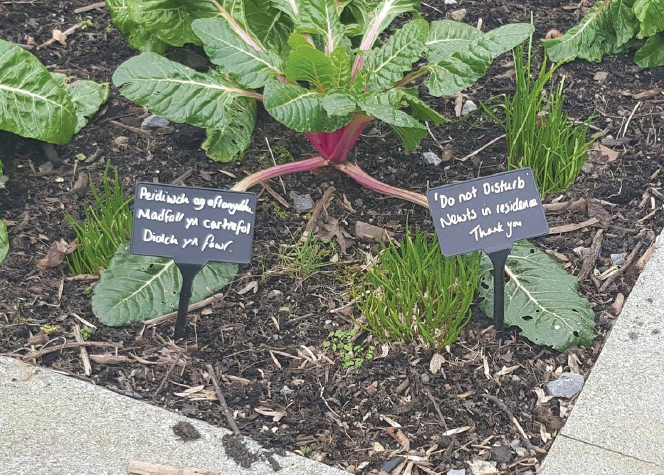 THE NATIONAL BOTANIC GARDEN OF WALES’ (NBGoW) use of the Welsh language – or lack thereof – has been an issue for some time, but it seems that the organisation are slowly making steps to improve their use of the Welsh language.
THE NATIONAL BOTANIC GARDEN OF WALES’ (NBGoW) use of the Welsh language – or lack thereof – has been an issue for some time, but it seems that the organisation are slowly making steps to improve their use of the Welsh language.
This week, The Herald investigates the Garden’s use of Welsh and whether their language diversity has improved over the last year.
WHAT IS THE NATIONAL BOTANIC GARDEN OF WALES?
Situated in Llanarthne, the NBGoW is a botanical research and conservation centre, which features the largest glasshouse of its kind in the world.
The Garden, set in a Regency landscape, is home to plants from across the world, themed gardens, play areas and a national nature reserve.
The NBGoW holds a number of events throughout the year and constantly works hard to bring visitors to the Garden with discounted tickets and enjoyable events.
The Garden was opened to the public for the first time in May 2000, and after running into financial difficulties only a few years lady, the Garden accepted funds from the Welsh Government and Carmarthenshire County Council.
Since then, the Garden has been put under pressure to use more Welsh in order to celebrate our heritage and the importance of our language.
THE GARDEN’S ATTITUDE TOWARDS THE WELSH LANGUAGE
Early last year, campaigners for the Welsh language revealed that the Garden lacked a fully bilingual website, erected English-only signs and sent correspondence in English, without Welsh translation.
It is alleged that on one occasion, the Garden’s director at the time, Dr Rosie Plummer, asked Welsh language pressure group Cymdeithas yr Iaith not to write to the Garden in Welsh.
Due to the NBGoW’s attitude towards the Welsh language, Cymdeithas yr Iaith tried to organise a meeting with the Botanic Garden to discuss becoming more bilingual.
When the Garden refused to hold the meeting with Cymdeithas yr Iaith in Welsh, the campaigners wrote a letter to First Minister Carwyn Jones, who is responsible for the Welsh language, to complain.
Cymdeithas yr Iaith’s rights spokeswoman Manon Elin said: “As an institution which receives a lot of public money, they should be duty bound to stick to their language scheme, and to provide a bilingual service.
“By refusing to meet us in Welsh, and by treating our officers in such a way, they are certainly breaking their language scheme, but we also believe they are in breach of their grant agreement with you. We would like you to use the power of that language condition in the agreement to ensure that the Gardens conform to the basic demands of their language scheme. We hope that will lead to creating a body which is a positive for the Welsh language nationally and locally, instead of being an embarrassment as it is now.
“People have the legal right to communicate with bodies in Welsh, and a number of our members feel a lot more comfortable speaking Welsh in these types of meeting. The Gardens receive hundreds of thousands of pounds in public money in an area where very many people speak Welsh. We have tried to be patient in our attempts to arrange a meeting with them, but the Director’s attitude has made that impossible.”
THE TWO FINALLY MEET
When Cymdeithas yr Iaith finally met with the NBGoW in October 2015, the Garden agreed that they would no longer use English-only signs.
The Herald visited the Garden on Saturday (Feb 27) to find that everything at the site is bilingual; from menus to plant information and everything in between.
Despite the fact that the two organisations came to an agreement about the signs, Cymdeithas yr Iaith said that there was a lot more for the Garden to do in regards to training staff and recruiting.
At the time, David Williams, who represented Cymdeithas yr Iaith in the meeting, said: “This constructive meeting shows that there has been a change of attitude on the part of the Garden. Following pressure from Cymdeithas, the meeting was held through the medium of Welsh – something the Garden was not willing to do a few months ago.
“They have now promised that they will comply with their language scheme – so the unfortunate situation with English-only signs will not occur again. As a national institution – and an employer in an area with a large percentage of Welsh speakers – it’s vital that the Garden respects and supports the language. In addition to what they’ve promised, they should have a plan to recruit more workers who can speak Welsh.”
Manon Elin added: “We welcome this change of attitude. Despite the long delay in ensuring that information on the Garden’s website is available in Welsh, despite the fact that the Garden received additional funding in 2012 in order to launch a bilingual website, they have promised that they will launch a new, fully bilingual website in the New Year, and we welcome that. With these developments, we hope the Garden will be more ambitious and make Welsh the language of work too.”
FUNDING FOR THE GARDEN
The NBGoW receive a £650,000 grant from the Welsh Government under the condition that they provide services in Welsh.
We spoke with the Welsh Government, asking them what they thought about the Garden’s commitment to The Welsh Language. They said: “The Garden also received £70,000 from Carmarthenshire County Council last year, but in order to secure the grant they had to promise that they would improve their use of the Welsh language.”
“The NBGoW were made to work with Mentrau Iaith, who were to help them become fully bilingual. “The amount that the Garden will receive over the years will reduce, however. Although the Garden received £70,000 at first, the funds will reduce dramatically to £30,000 by 2017-18.
The Welsh language condition was welcomed by Cllr Mair Stephens, the council’s Welsh Language Champion, at the time. She said: “This is an opportunity to underline that we are a bilingual county.”
THE LOSS OF DR ROSIE PLUMMER
The funding cuts caused Rosie Plummer to leave her job as Director for the NBGoW, a position she had held for six years.
She said that it was time for someone else to take over, now that the Garden had to be run “on a shoe string” budget.
Ms Plummer said that the Garden’s main purposes were conservation, education and inspiration, but in recent years, she felt that the NBGoW had to diversify towards commercialisation and tourism.
THE MOST RECENT MEETING
At the beginning of the month, Carmarthenshire County Council’s Executive Board met to consider how they would support the future management of the NBGoW.
Despite previous discussions about the Garden’s language policy, it did not seem to be an important issue at the most recent meeting, eight months later.
We contacted Carmarthenshire County Council to ask why the issue was not discussed while making decisions on the Garden’s future funding.
Resources Executive Board Member Cllr David Jenkins said: “At the Executive Board meeting on February 1, councillors discussed the Garden’s response to their request for a discounted offer for Carmarthenshire residents.
“They had discussed the Welsh language at a previous meeting, where they asked that the Garden by requested to liaise with Menter Cwm Gwendraeth Elli on its commitment to the Welsh language.”
HAVE THEY DONE ENOUGH?
This week, we contacted Cymdeithas yr Iaith to ask if they felt if the Garden had improved to a high enough standard.
Manon Elin, Chair of Cymdeithas’ Language Rights Group, who also lives in Carmarthenshire, said: “Following complaints by members and supporters in Carmarthenshire last year, Cymdeithas yr Iaith corresponded with the Director and Trustees of the National Botanical Garden and met with them.
“In letters and meetings, it was said that a new website and fully bilingual website was to be launched early this year. Without a new website there is no evidence of further change.
“Following the announcement that the Director of the Garden will be stepping down, for example, we called on the Trustees to ensure that the next Director can speak Welsh, and that jobs from now on require Welsh language skills. We have had no response apart from a promise that the post will be advertised in Welsh.
“In Carmarthenshire we have been calling on the County Council to move towards working in Welsh. The first step towards that would be to state that Welsh is the main language of the Council. We want to see the same happen at the Botanic Garden as with other bodies.
“However, changing the everyday language will not happen immediately, and not with the appointment of one new individual.
“As a national organisation that receives public funding, in an area that continues to have a significant number of Welsh speakers, why shouldn’t the Botanic Garden make Welsh its main working language?”
WHAT THE GARDEN HAD TO SAY
The Herald contacted the Garden to ask them about their commitment to the Welsh language.
Speaking about the importance of using the Welsh language, the NBGoW’s Interim Director, Gary Davies, said: “The Garden is an important feature of national life in Wales and fully committed to embodying the country’s language, culture and heritage.
“This is seen by the Garden as extremely positive from a local and national perspective and is reflected in the comprehensive range of bilingual services available to visitors.
“In addition, as an organisation that is part publicly funded, the Garden is obliged to meet the recently announced Welsh Language Standards and to comply with their requirements. The Garden is an asset for all of the people of Wales and this is reflected in its bilingual policies.
“This is evidenced in the Garden’s Ten-Year Strategic Plan where the Garden undertakes to ‘celebrate and positively promote our national identity by ensuring that the Welsh language and culture are embedded in the Garden’s ethos, activities and programme of events.’”
We asked if the Garden felt like their use of the Welsh language had improved over the years.
Mr Davies replied: “The Garden is always looking at ways to improve and diversify its visitor offer and relevance to the people of Wales and all of these improvements fully incorporate the Welsh language.”
Finally, we asked if the Garden had plans to further improve their use of the Welsh language, to which the Interim Director replied: “The Garden’s commitment to the future of the Welsh language is clearly evidenced by its strategic importance in the Ten-Year Plan.”
“We expect the Garden to deliver against a Welsh Language Scheme in the same way that we expect all bodies that work in Wales to support the Welsh language. The Garden has its own Welsh language policy and we have held meetings with them to discuss this. However, it is for the Garden to comment upon their ambitions for expanding the use of Welsh beyond that set out in their policy.”

















Add Comment